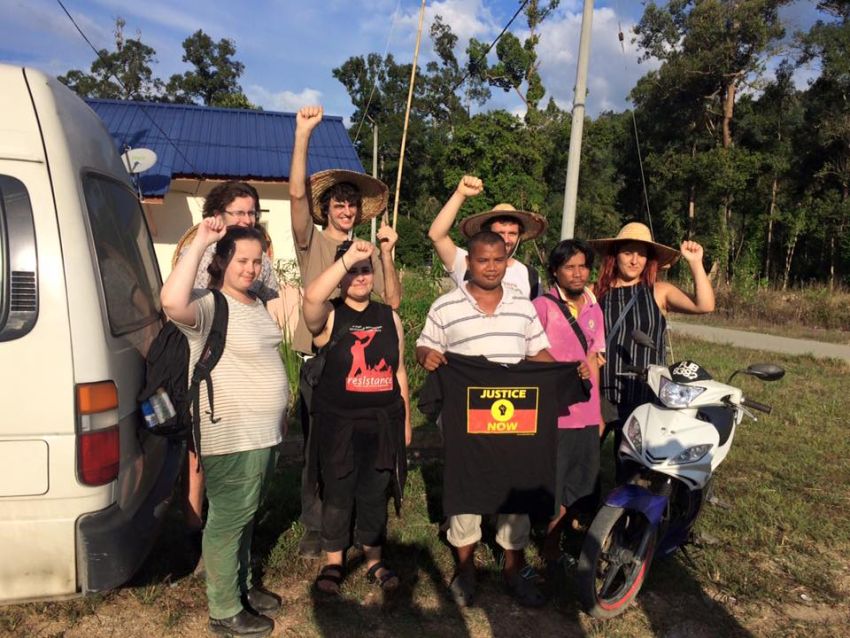
This is the final part of a three-part feature on an exposure tour of Malaysia hosted by the Socialist Party of Malaysia (PSM), in which five Resistance: Young Socialist Alliance members participated over January 15 to 26.
* * *
In our travels in the state of Perak, it became clear that overdevelopment is a serious issue in Malaysia. Everywhere we went, there were large-scale housing estates in construction, huge shopping complexes being built and whole new town centres in the process of being built or expanded.
Contrast this with the many residents in the state who have been waiting for housing for 18 years and the number of abandoned businesses and larger shopping complexes that have either been built and never used or later abandoned.
One such empty shopping complex is causing health problems for an old tin mining housing estate, as the empty building has become a nest for hundreds of birds. The resulting noise and bird droppings are having a negative impact on the community: basic things like hanging out their washing to dry have now become difficult.
But no government department wants to deal with the problem, which is why PSM members are working with the community to try to get some results.
Overdevelopment and land grabs
This drive for development is also why so much government land that was once used for plantation work or tin mining has been sold off to private developers. The developers are now causing problems for the residents who still live on the land, deeming them “illegal squatters” and attempting to evict them from land they have lived on for generations.
Another example of this is the ethnic-Chinese farmers in Tronoh area. The farmers have turned old tin mining land into productive, food-producing farms. Abandoned man-made lakes that were left after the mining ended are now fish farms. Their produce is sold across Malaysia and Singapore.
Despite this productivity, they have received letters deeming their occupation of the land illegal because a private developer wants to build a theme park. Once again, the PSM has taken up this issue in a serious way with the local farmers, including turning the local issue of land rights into a national issue of food sovereignty.
It is also worth asking who this development is for. Who does it benefit? Obviously the private developers are making money or they would not keep building. But are the houses affordable for those who actually need housing in Malaysia?
We saw more than one example of low-cost housing. They were blocks of units where people lived in cramped conditions, often with poor safety, such as no railings on staircases and balconies. Despite the intention that this sort of housing is temporary, the reality is that low-income workers in Malaysia cannot afford to buy their own houses and renting is not really an option in Malaysia.
Who are the theme parks and mega malls for? Not for the average Malaysian worker who can buy a drink at a street stall or cafe for 3 or 4 MR, while that same drink is upwards of 7MR in a mall. This rampant consumerism is directed towards wealthier Malaysians and foreign tourists, giving the impression that Malaysia is the country to go to for cheap shopping.
Environmental destruction
It is not only the people struggling under this rapid development. The environment is suffering too. Despite the fact that, on paper, Malaysia has one of the best rainforest protection policies in developing Asia, all this overdevelopment is at the cost of widespread deforestation.
According to the United Nations, Malaysia's deforestation rate has risen faster than any other tropical country in the world. This is also due to urbanisation, agricultural fires and large-scale forest conversion to oil palm plantations.
This is also impacting on the Orang Asli, Malaysia's Indigenous population, whose whole way of living is centred around the biodiversity of the jungle that is rapidly disappearing.
The tour was lucky enough to visit a village to which the Semai tribe of the Orang Asli had been relocated, due to a number of hydroelectric dam projects that will flood a large area, including their historical village.
A small number of people in this village are opposed to the dam projects and are working with the PSM. However, most of the village, including their leader, have been convinced of the economic benefits of the dam, despite the fact it will flood their home.
One of the activists we spoke to invited us on a one-hour boat ride up the river to visit his old home. This was the original village of those who had been relocated to an area known locally as the “desert” because the land is so barren compared to their original village, which is surrounded by jungle.
National campaigns
As well as local land and housing struggles, the PSM and PSM Youth are involved in national campaigns. PSM Youth is part of a coalition of 20 student groups, which was formed to bolster the still campaign for free education.
The PSM have also been actively campaigning for an increase in the minimum wage and have also set up a national hotline for workers to ring in if they are being underpaid.
The PSM was also active in the campaign against the introduction of a 6% GST in April last year. One of the larger national campaigns at the moment is the movement against the Trans-Pacific Partnership Agreement, which mobilised thousands of people on the streets of Kuala Lumpur on February 23. Read more about the rally.